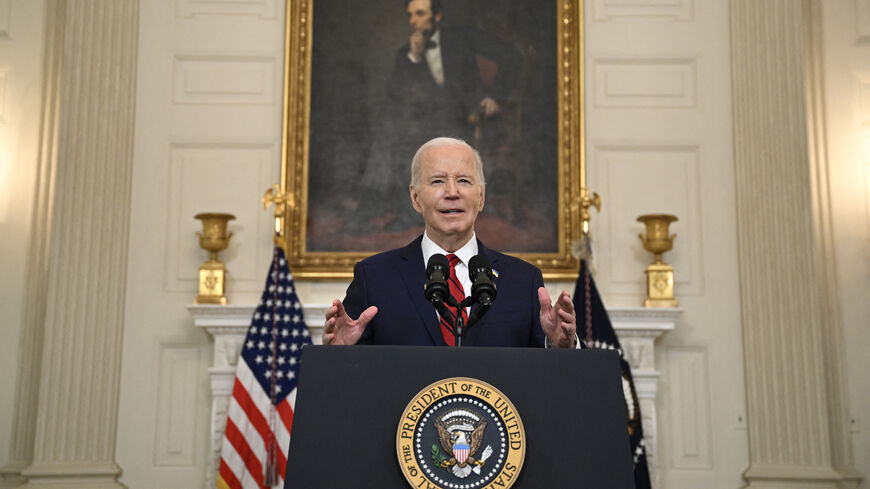Is Biden trying to undermine Netanyahu’s war cabinet from within?
Israeli Defense Minister Yoav Gallant has exposed a fault line over day-after planning for the Gaza Strip.

WASHINGTON — US President Joe Biden may have found an ally in Israeli Defense Minister Yoav Gallant, who this week called out Israeli Prime Minister Benjamin Netanyahu for stonewalling on postwar planning for Gaza.
Gallant, a member of Netanyahu’s Likud party, said that Israeli military rule in Gaza, which Netanyahu has suggested, would undermine Israeli gains in the war.
Ben Caspit, reporting from Tel Aviv, writes that Gallant’s remarks were a “declaration of war” on Netanyahu, “sending shock waves through Israel's political and military establishments.”
Gallant’s remarks were “extraordinary, perhaps unprecedented in the annals of Israel's wars,” writes Caspit, exposing “the seismic fault line in the Israeli government, with one camp led by Netanyahu and his ultranationalist coalition partners, and the other by Gallant and his war cabinet colleagues Benny Gantz and Gadi Eisenkot, both retired generals. An Israeli diplomatic source speaking on the condition of anonymity told Al-Monitor that the Netanyahu camp sees US Secretary of State Antony Blinken as a member of the opposing faction, calling it a "government within a government" and describing its actions as a rebellion.
Gallant’s remarks followed those of Blinken, who said earlier in the week that the United States will not support an Israeli occupation of postwar Gaza.
This may be the break Biden’s team has been waiting for. Biden has been desperate to shift Netanyahu’s stance on the war or, failing that, undermine his hard-right coalition.
Biden, falling back on his special connection with Israelis, has tried to make their differences over the war personal, reiterating that his support for Israel is "ironclad."
Netanyahu’s hold on power has nonetheless remained firm.
The issues that have divided Biden and Bibi are more policy than personal. There are no Israeli coalitions of any impact calling for Netanyahu to open up more humanitarian corridors to Gaza, to hold off on a military operation in Rafah or to back a Palestinian state.
Gallant may have given Biden an opening, or not. It’s unclear how far Gallant can or will go to take on a prime minister of his own party during a war. Probably more than any other cabinet official, the defense minister feels the heat from Washington. He knows Israel cannot manage postwar Gaza without the United States, in addition to the role of Arab states that have made clear that a Palestinian state is a condition for their support.
Netanyahu also knows that postwar Gaza will need US and Arab support, and he likely hasn’t given up his legacy pursuit of normalization with Saudi Arabia, which can only happen following the establishment of a Palestinian state. But he can’t make that deal if he’s not prime minister. And his political survival, for now, rests on right-wingers who are locked into his hard line.
House passes Israel bill over Biden objections
The White House continues to seek to contain potential fallout from the war on the November presidential elections.
The Republican-controlled House of Representatives this week passed a bill to force Biden to make congressionally approved weapons sales to Israel. Sixteen Democrats joined Republicans to pass the legislation, which is dead in the Senate and has no chance of becoming a law, as Megan Mineiro reports from Washington.
The House bill is nonetheless another sign that Republicans will seek to tag Biden for undermining Israel’s right to defend itself by conditioning or withholding arms sales.
The White House is scrambling to prevent key Democratic constituencies — progressives, students, Arab and Muslim Americans — from voting for former President Donald Trump or antiwar candidates such as Jill Stein or Cornel West.
Those votes could matter. Trump leads Biden in the most recent polling in all seven battleground states, according to Real Clear Politics.
As we wrote last week, the only way out for Biden in dealing with the antiwar coalition is to shift the conversation to a cease-fire in the short term and a grand bargain including a two-state solution once the war ends.
For Biden, this is all beyond agonizing. He would prefer to just have Israel’s back and leave it at that. The shift toward pressure is as much the result of these fissures among Democrats as it is the outrage throughout the region and the world over the Israeli conduct of the war, which has led to 35,000 Palestinian deaths (not counting as many as 7,000 missing in the Gaza rubble), nearly 78,000 injured, 1.7 million displaced and 1.1 million facing food insecurity or famine.
More coverage of Israel-Hamas war
- Yun Sun breaks down why China increasingly sees Hamas as a legitimate political force in the political process on Palestine’s future and statehood.
- Daoud Kuttab explains why the Palestinian Authority is not interested in cooperating with Israel on piecemeal projects that don't include a broader agreement on postwar governance of Palestinian territories.
- Jared Szuba explains why Israeli forces are returning to areas of northern Gaza to rout Hamas fighters from neighborhoods they had previously cleared.
- Rina Bassist reports on Israel recovering the bodies of three hostages from Gaza as US national security adviser Jake Sullivan heads to the region.







